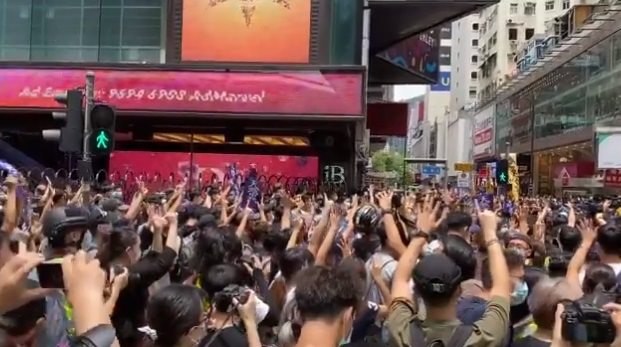On Sunday, hundreds of pro-democracy protesters hit the streets in Hong Kong to protest against China's new national security law for the city. The legislation, details of which hasn't been disclosed, aims to ban sedition, secession, subversion, terrorist activities, and foreign influence in the city's affairs.
Beijing critics and pro-democracy activists see it as an attempt to muzzle dissent in the semi-autonomous city, that enjoys larger rights, including freedom of speech, not present in the Chinese mainland. As a result, scores of Hong Kongers protested against the law, seen as the "end of Hong Kong" by many, including city legislators.

Protests Were Observed in Causeway Bay and Wan Chai Districts
Widespread protests were observed in the busy Causeway Bay and Wan Chai districts, where protesters raised slogans against the government, AFP reported. "Topple the communist government" signs were seen on the ground at Causeway. Slogans demanding "Five demands, not one less" and "Hong Kong's independence the only way out" were raised. They did not follow social distancing rules as a precaution against novel coronavirus.
Soon riot police were deployed to quash the protests. Warnings against unauthorized assembly were earlier issued. The city's own coronavirus guideline which prohibits assembly of more than eight people couldn't stop the protesters from demonstrating against the security legislation. Protesters hurled umbrellas and plants at the police, which in turn used pepper spray. Tear gas shells and water cannons were also used to disperse the crowd.
Heckling between police and protesters was also observed. At one instance, a protester was pinned to the ground by the police and was later arrested. They also applauded the police, satirically and called them "communists' dogs" and compared them to the Imperial Japanese army.
Last year, the city was rocked with months of pro-democracy protests, that first erupted due to legislation that allowed Hong Kongers to be extradited to the mainland. Although peaceful at first, demonstrations turned violent. Over 8,300 people were arrested then. The protest, however, fizzled out after mass arrests and the lockdown imposed to stop the spread of novel coronavirus.
Read more








